This is one of two young siblings “walking the pipe” as it tries to develop its coordination. A year ago I posted photos of one of them doing this but all 9 of these images are new to my blog. The photos were taken on July 4th of last year. I don’t know the sex of this bird but for the sake of convenience (and equality after using “he” so often in the past) I’ll refer to it as a female.
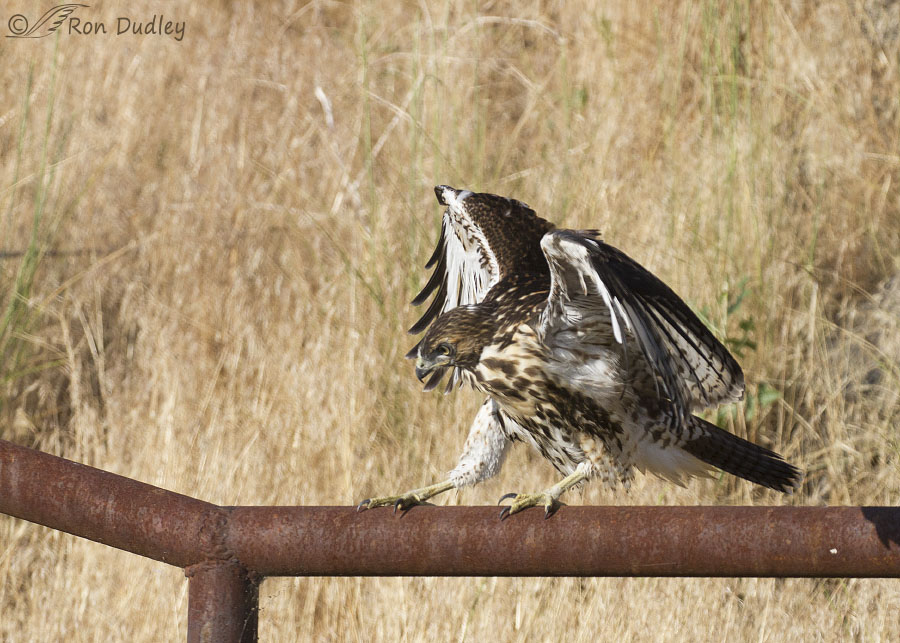
1/2000, f/6.3, ISO 500, Canon 7D, Canon EF 500mm f/4L IS II USM @ 255mm, not baited, set up or called in
The pipe is part of an enclosure protecting a small spring from cattle damage and the newly fledged hawks were using it in an apparent attempt to improve their balance and coordination. Believe me they needed it. With the two joined pieces of pipe it was probably about 50′ from one end to the other and this bird was determined to walk the entire distance without falling off.
Here she had just landed after a short hop on the pipe but she walked the entire rest of the way.
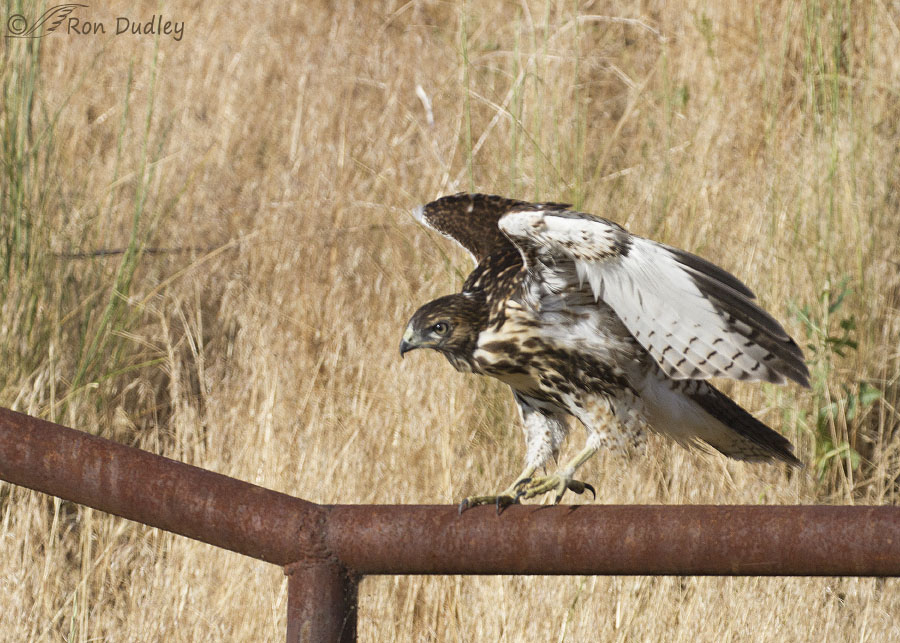
1/2000, f/6.3, ISO 500, Canon 7D, Canon EF 500mm f/4L IS II USM @ 255mm, not baited, set up or called in
Here she was still recovering from the hop and checking out the welded bend in the pipe she would soon have to negotiate.
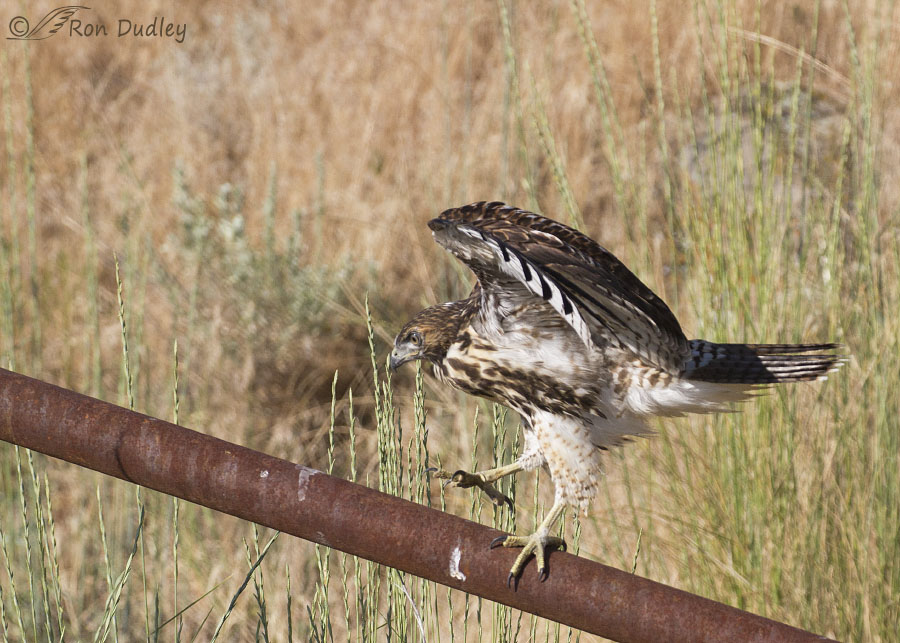
1/2000, f/6.3, ISO 500, Canon 7D, Canon EF 500mm f/4L IS II USM @ 255mm, not baited, set up or called in
She made it past the bend just fine and plowed right through some of the grasses actually touching the pipe.
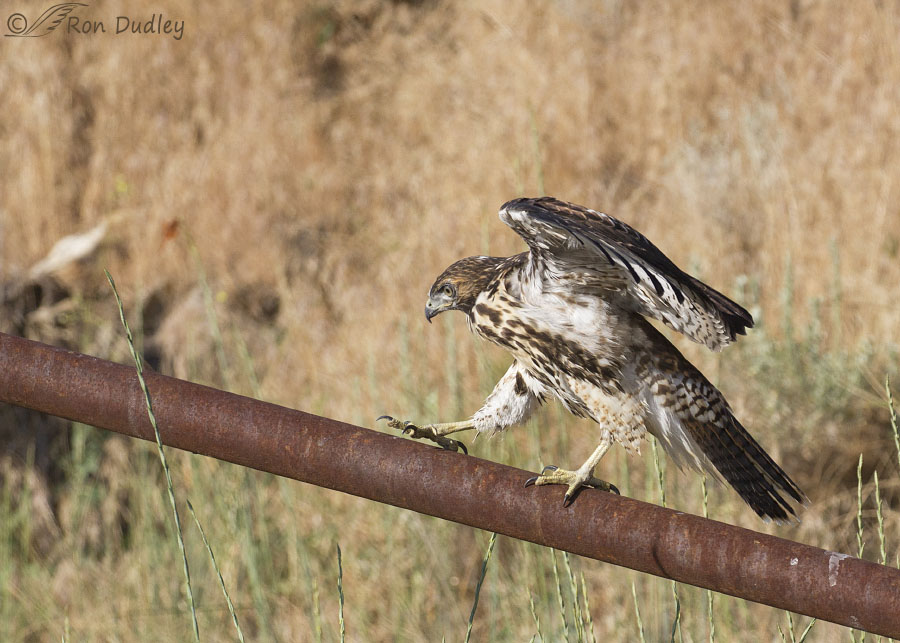
1/2000, f/6.3, ISO 500, Canon 7D, Canon EF 500mm f/4L IS II USM @ 255mm, not baited, set up or called in
She was very deliberate in placing each foot in the center of the pipe as she walked. If foot placement was off-center she slipped.
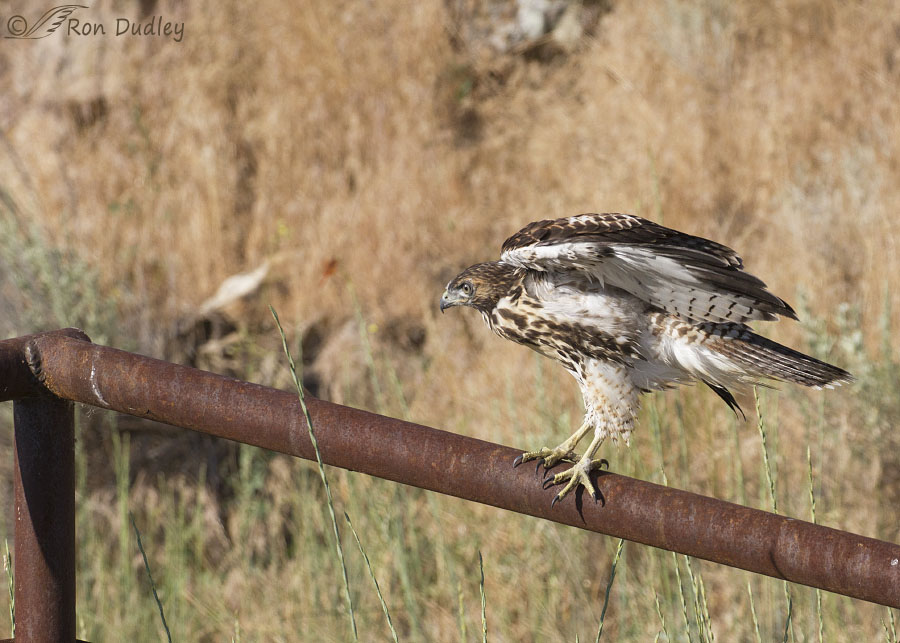
1/2000, f/6.3, ISO 500, Canon 7D, Canon EF 500mm f/4L IS II USM @ 255mm, not baited, set up or called in
Now we finally see her goal where the pipe ends and another one takes a sharp left turn.
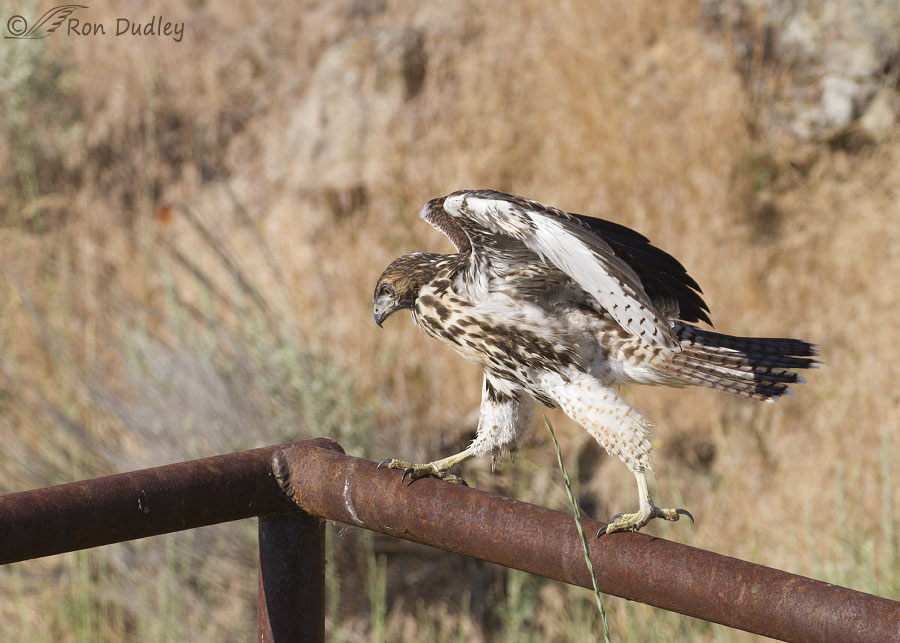
1/1600, f/6.3, ISO 500, Canon 7D, Canon EF 500mm f/4L IS II USM @ 255mm, not baited, set up or called in
She has her eye on the prize.
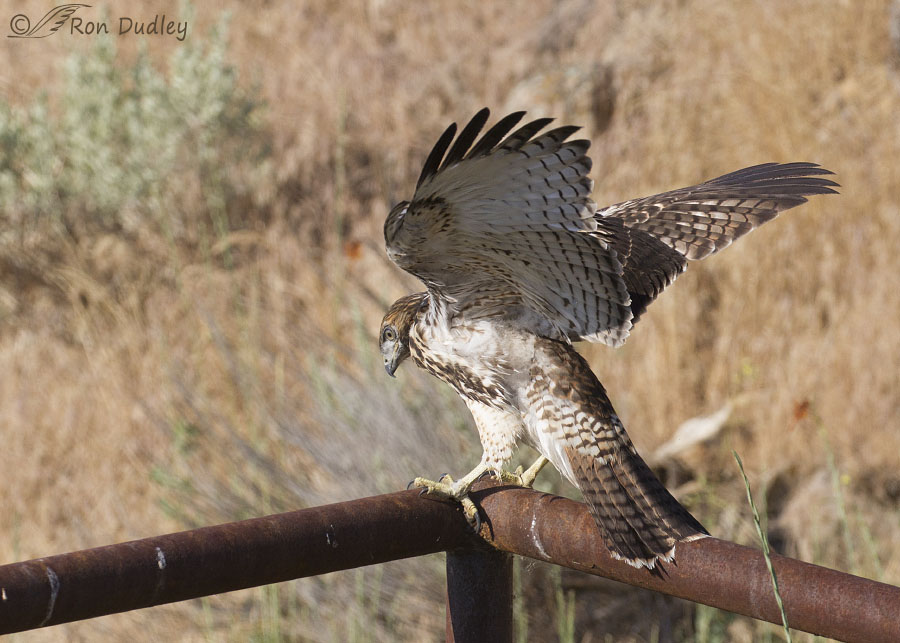
1/1600, f/6.3, ISO 500, Canon 7D, Canon EF 500mm f/4L IS II USM @ 255mm, not baited, set up or called in
Success! And she did it without quite falling off, although once she came very close.
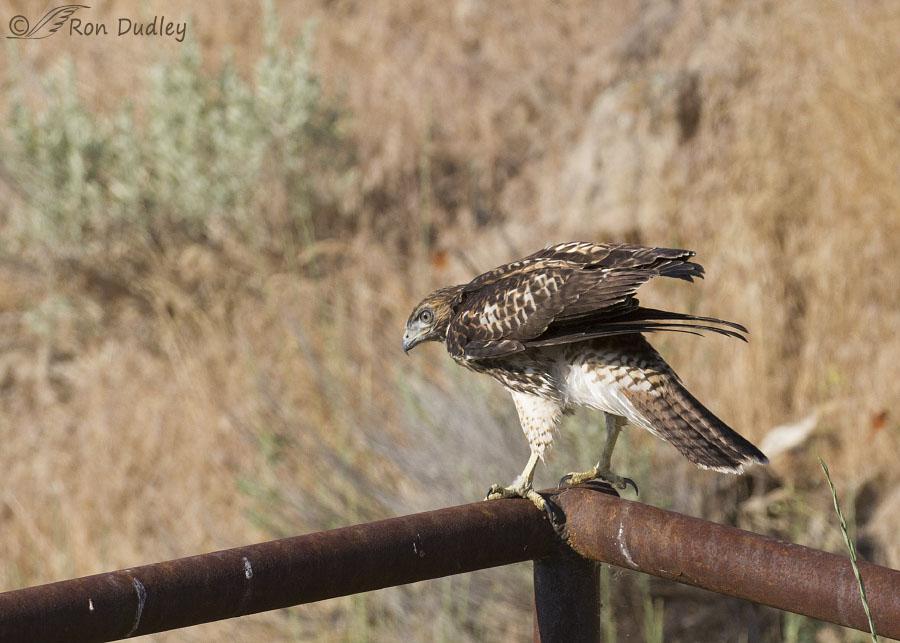
1/1600, f/6.3, ISO 500, Canon 7D, Canon EF 500mm f/4L IS II USM @ 255mm, not baited, set up or called in
From here she took off straight ahead and landed next to her sibling on the hill right in front of her.
But just a few minutes later one of the siblings (I don’t know which one) flew down and landed on the “beginning spot” of the pipe as if to repeat her performance. But this time the bird took the easy way out and…
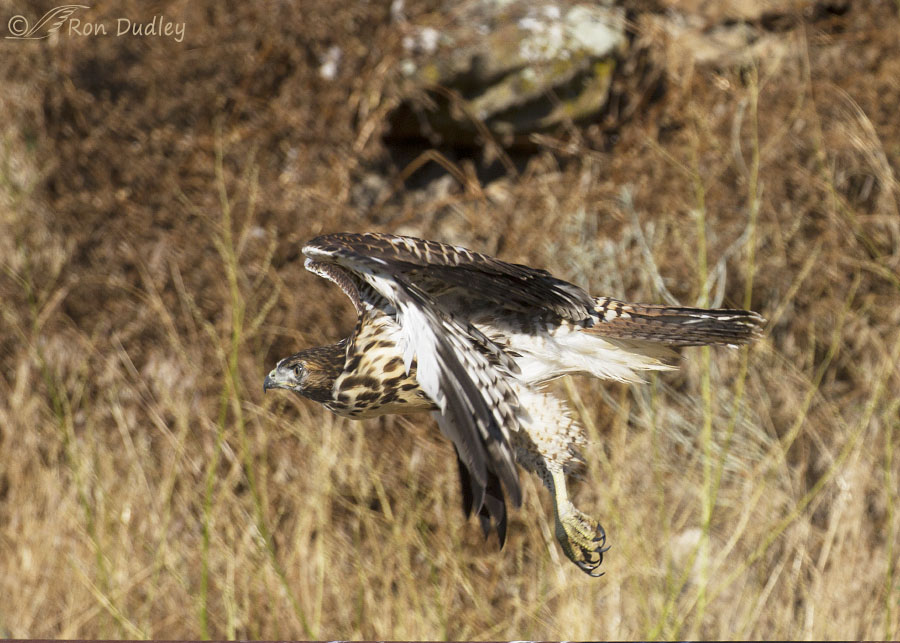
1/2500, f/6.3, ISO 320, Canon 7D, Canon EF 500mm f/4L IS II USM @ 312mm, not baited, set up or called in
chose to fly from one end of the pipe to the other rather than walk it again. I had to rotate this image to get the pipe level so I was only able to leave a tiny sliver of it at bottom but it’s enough for you to see how close she was to the pipe.
My guess is it was the same bird and at the last minute she decided she didn’t want to run the gauntlet again. I have to wonder how many times these birds did this when I wasn’t there.
Ron


Just starting out, vacationing in Alaska. Starting taking photos, but wow. It’s hard catching birds in flight, can I ask what kind of gear do you use for those close up in flight pics??
Greg sampson
Greg, All that info is included in the image techs beneath each photo…
Love these photos Ron!!
Feeling a tad inferior here.
I couldn’t walk that pipe as a fledgling. I couldn’t walk that pipe now.
Loving the series. Awed by the bird.
It would have been very difficult for me too, EC. Thanks.
These juvenile Red-Tailed Hawks must be pretty intelligent to know that they need to work on their coordination. I wonder if the parents show this activity to them and they work on it or they just do it on their own.
The things that young birds do is scary sometimes as they put themselves in danger. I don’t want to think about the consequences.
Thank you Ron, for the very interesting post. You certainly captured many movements on the pipe.
I’m pretty sure they do it without being shown by their parents, Alice. Thanks.
Great series!!! Love the first most of all…so focused and tentstive…Funny…and impressive…
Thank you, Patty.
Damn, I like this series, and the fact that it’s a series, with the explanatory story. That’s the way I like it!
Good! Happy to know that, Martha.
This one seems much more adept than its sibling! These pipe-walking series are so interesting. I wonder if this year’s fledgies will do the same. Seeing those talons in the takeoff shot gives me some pause as well — especially if I were a vole.
Yup, a vole wouldn’t have a chance, once they learned how to use them…
Have been watching the three youngins at Cornell learning the ropes. Never cease to amaze and also give me an occasional laugh. Thanks, Ron.
That must be fun, Sarah.
Thanks for this wonderful post that has given me this little peek into her life. I love seeing her as she is learning to navigate her world!
You’re very welcome, Sharon.
Is it bird intelligence or instinct to choose an object (albeit not a natural one) that is free of obstacles in which to practice this important skill? It appears very deliberate. Does this span of pipe and its attributes become knowledge that is passed down through successive broods originating from the same parents? Whatever it is, it is fascinating behavior to to witness and record. Thanks Ron!
Interesting questions, Robert. Drives me nuts thinking about that stuff sometimes…
Great shots Ron. Must have been really interesting to watch as well as photograph. They grow up so fast that after a couple months he or she will go from that awkward pipe walk to swooping down to grab a meal. Photo seven is my favorite – beautiful with the wings extended like that.
Everett Sanborn
Prescott AZ
You’re right, Everett – their skills improve quickly. However they’re still being developed for many months and many of them don’t survive because they’re not completely fine-tuned, even after that long.
It’s wonderful that you got to watch this behavior. Considering that the pipe is a curved surface, I think it’s amazing that she was able to negotiate it as well as she did. I’m sure that skill will go a long way toward being coordinated in other situations. Seeing this series put a smile on my face. Thank you for that.
Special is right, Susan. I felt very privileged.
Man, look at that persistence! She (it) will be a successful female, no doubt!
Wonderful series Ron, many thanks.
I hope she’s still “out there” somewhere, Dick. Thank you.
Fun! The concentration it takes to master these tasks is apparent in her “walk”
The concentration it takes to master these tasks is apparent in her “walk”  She was taking some pretty long strides too rather than just “scooting” along…….
She was taking some pretty long strides too rather than just “scooting” along…….
Thanks, Judy. Her longest stride was right near the end – at that point I think she was tired of walking and concentrating so she was in a hurry to get there.
Fascinating behavior. Thank you!
Thanks, Richard.
I guess one has to compare how much effort and energy it takes to walks the distance versus flying the distance. That’s my conjecture about having to use two very different sets of limbs. After all, we can crawl 4 legged or use our arms and butt to get down steep inclines facing forward.
Last night, a very young House Sparrow fledgling landed on the side of my dog and attempted to fly-walk up to her back. I scooped the short tailed youngin off Kitsu’s back before she could bite it and it continued to fly-walk up my side to my shoulder. It took off from this lofty perch. quickly lost altitude and landed in the street. After two more short bouts of testing its wings, it was able to return to the relative safety of the bush where its journey began. I think this was the first time it tried its wings. It showed no caution about a dog, human or moving car.
From the red-tail photos, it appears those birds learn to use their wings first and then concentrate on using their legs well.
Yes, fledging is a hazardous process for birds, that’s for sure.
I think you’re right about the timing of wings vs legs. These birds had to fledge out of a nest high on a cliff so that makes perfect sense.
Ron, I am impressed with her (and your) persistence in (respectively) accomplishing and documenting this feat of footwork.
Much appreciated, Ken. Thanks, from both of us…
Isn’t nature wonderful! I sometimes watch events like this spellbound with the process birds/animals go through in maturing or just plain life. Can we call it logic…thinking…I really don’t know but it certainly is a process that mimics everything I would call as such. These are terrific. Glad you were able to be there and catch this and share with all.
“Thinking”, at least on some level, works for me, Kathy. Thank you.